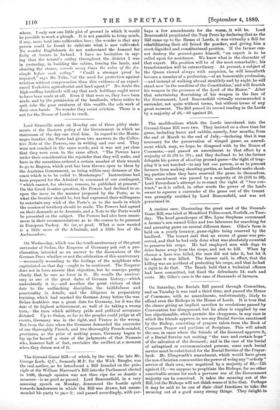On Wednesday, which was the tenth anniversary of the great
surrender of Sedan, the Emperor of Germany put out a pro- clamation, intended as an answer to the discussions of the German Press whether or not the celebration of this anniversary —necessarily wounding to the feelings of the neighbour who capitulated on that day—ought to be continued. The Emperor does not in form answer that objection, but he conveys pretty clearly that. he sees no force in it. He recalls the anniver- sary as one of the great dates of German history,—which undoubtedly it is,—and ascribes the great victory of that date to the unflinching discipline, the faithfulness and punctuality in details, and the diligence in preparatory training, which had marked the German Army before the war. Sedan doubtless was a great date for Germany, for it was the date of its highest achievement, as well of its taking a wrong turn,—the turn which military pride and political arrogance dictated. Up to Sedan, so far as the peoples could judge at all events, Germany was in the right, and France in the wrong. But from the date when the Germans demanded the surrender of one thoroughly French, and two thoroughly French-minded, provinces, as the price of making peace, Germany began to lay up for herself a store of the judgments of that Nemesis who, however halt of foot, overtakes the swiftest at a moment when they dream not of it.


































 Previous page
Previous page